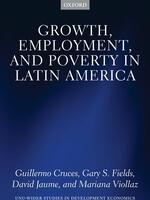Filter by...
Reset all
Publications (35)
Working Paper
pdf
Violent conflicts affect the lives and livelihoods of almost one quarter of the world’s population. But the effects of violent conflict are not uniform. This study assesses the differential effects of violent conflict on young people’s education, job prospects, and forms of civic engagement and...
Journal Article
THIS ARTICLE IS ON EARLY VIEW | This article introduces the Mapping Attitudes, Perceptions and Support (MAPS) dataset, which provides rich survey data from more than 12,000 respondents in Colombia. Our panel survey – carried out in two separate waves in 2019 and 2021 – is representative at the level...
Report
pdf
This report documents COLMOD, the SOUTHMOD micrososimulation model developed for Colombia. It describes the different tax–benefit policies in place, how the microsimulation model takes advantage of these different provisions, and the database on which the model runs. It concludes with a validation...
Journal Article
This peer-reviewed research is available free of charge. UNU-WIDER believes that research is a global public good and supports Open Access.
– Micro evidence from Colombia
THIS ARTICLE IS ON EARLY VIEW | A growing literature has documented widespread variation in the extent to which insurgents provide public goods, collect taxes, and regulate civilian conduct. This paper offers what is, to our knowledge, the first study of the long-term economic legacies of rebel...
Working Paper
pdf
– COVID-19 and climate change
Terrorist and other types of armed groups often exploit natural and human-made disasters and emergencies to advance their causes. This paper studies how some armed groups have responded to two recent global emergencies—climate change and the COVID-19 pandemic. It examines the messaging and actions...
Working Paper
pdf
Rebels, militias, and criminal groups all govern civilians. Governing strategies adopted by armed groups during civil war likely influence citizens’ post-conflict political participation, with consequences for democratic politics.We theorize that an armed group’s position relative to the state (anti...
Working Paper
pdf
– Evidence from Colombia
This paper investigates how armed groups affect the organization of local communities during armed conflict in Colombia. We estimate the effect of communities’ exposure to armed groups with an econometric specification that takes into account individual and municipality-year fixed effects and an...
Working Paper
pdf
– How infrastructure contracts fund vote-buying
Where does the money come from to buy votes? We argue that an important source of funds for vote-buying comes from ‘contract clientelism’, or the provision of public contracts to private firms in exchange for campaign donations. Using quantitative data on Colombian infrastructure contracts, we...
Working Paper
pdf
– Evidence for Colombia
This paper studies the legacies of wartime institutions, measured as rebelocracy, on the ability of households to cope with negative income shocks. Rebelocracy is the social order established by non-state armed actors in the communities they control. By providing public goods and a predictable...
Working Paper
pdf
– Civic engagement in Colombia
This paper investigates the impact of inequality on individual civic engagement at the community level, whether this impact persists over time, and what mechanisms may shape the relationship between inequality and civic engagement. The results show that inequality in Colombia is associated with...
Working Paper
pdf
– Evidence from Ecuador and Colombia
The aim of this paper is to quantify the financial cost that informal workers would incur in the event of entering formality, accounting for potential earnings gains upon entry. To do so, we use representative microdata from Ecuador and Colombia, together with detailed tax–benefit models, and...

– (of Colpensiones, Colombia’s public pension and social security administrator) – Juan Villa
Four years ago, in 2014, Juan Villa spent three months at UNU-WIDER in our PhD Fellowship Programme. I spoke to him on a sunny September afternoon while he was back in Helsinki for the Think development - Think WIDER conference about his journey since his studies, and about what’s next. Juan grew up...
Book Chapter
This peer-reviewed research is available free of charge. UNU-WIDER believes that research is a global public good and supports Open Access.
From the book:
Growth, Employment, and Poverty in Latin America

This is an open access title available under the terms of a CC BY-NC-SA 3.0 IGO licence. It is free to read at Oxford Scholarship Online and offered as a free PDF download from OUP and selected open access locations. This book examines the links between economic growth, changing employment...
Working Paper
pdf
– Colombia country study
Between 2000 and 2013, Colombia experienced rapid economic growth. The country suffered a slowdown at the beginning of the period and during the international crisis of 2008, but during both slowdowns, the growth rate never turned negative. Most labour market indicators improved and followed the...
Working Paper
pdf
– The Missing Evidence from Luminosity Data
The effects of social transfers on growth are still unclear. The limitations of aggregated data at sub-national levels have confined the analysis to the use of simulation models and household surveys. As an alternative, this paper contributes to the empirical literature by assessing the effects of...
Displaying 16 of 35 results
 Join the network
Join the network